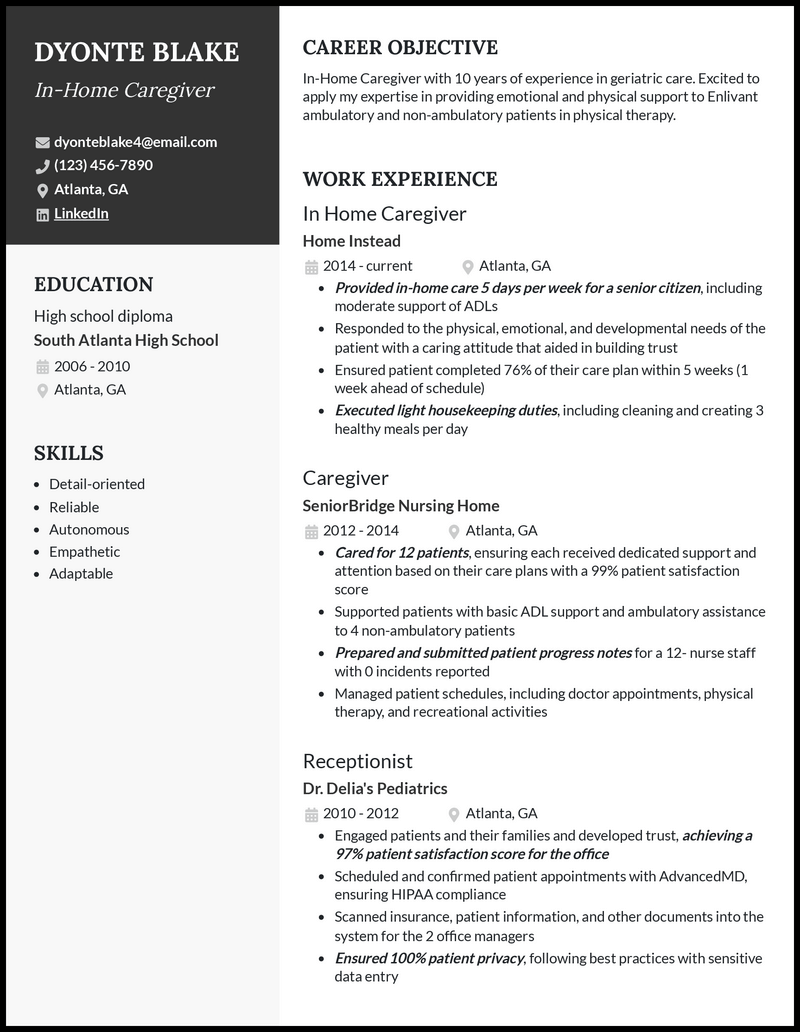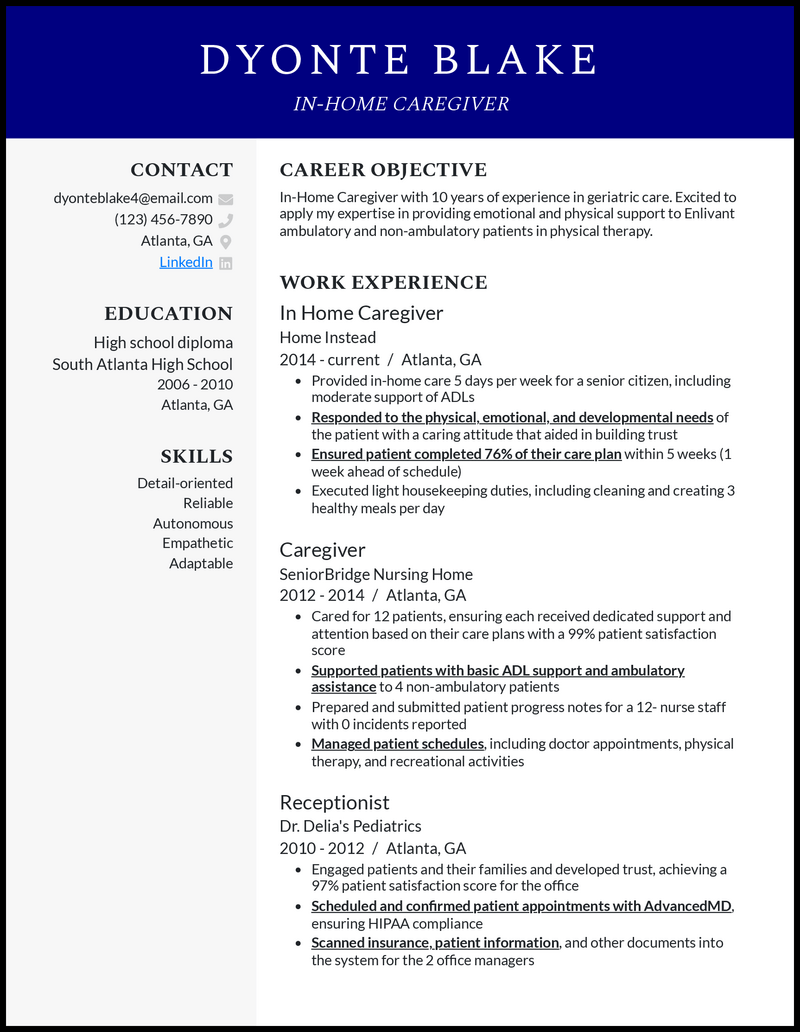You transform houses back into homes for folks struggling with shopping, housework, and personal care. You may assist the disabled with meal preparation or help elderly individuals dress and stay active.
But you might still have questions about resume writing, such as how to provide a snapshot of errands you help clients with or which activities of daily living (ADLs) to mention.
Don’t worry, we’ve helped many in your field showcase compassion and task management on their resumes, and these three home caregiver resume templates and a free cover letter builder should help you out, too.
Copy this text for your home caregiver resume!
Dyonte Blake
In-Home Caregiver
[email protected]
(123) 456-7890
Atlanta, GA
CAREER OBJECTIVE
In-Home Caregiver with 10 years of experience in geriatric care. Excited to apply my expertise in providing emotional and physical support to Enlivant ambulatory and non-ambulatory patients in physical therapy.
WORK EXPERIENCE
In Home Caregiver
Home Instead
2014 – current
Atlanta, GA
– Provided in-home care 5 days per week for a senior citizen, including moderate support of ADLs
– Responded to the physical, emotional, and developmental needs of the patient with a caring attitude that aided in building trust
– Ensured patient completed 76% of their care plan within 5 weeks (1 week ahead of schedule)
– Executed light housekeeping duties, including cleaning and creating 3 healthy meals per day
Caregiver
SeniorBridge Nursing Home
2012 – 2014
Atlanta, GA
– Cared for 12 patients, ensuring each received dedicated support and attention based on their care plans with a 99% patient satisfaction score
– Supported patients with basic ADL support and ambulatory assistance to 4 non-ambulatory patients
– Prepared and submitted patient progress notes for a 12- nurse staff with 0 incidents reported
– Managed patient schedules, including doctor appointments, physical therapy, and recreational activities
Receptionist
Dr. Delia’s Pediatrics
2010 – 2012
Atlanta, GA
– Engaged patients and their families and developed trust, achieving a 97% patient satisfaction score for the office
– Scheduled and confirmed patient appointments with AdvancedMD, ensuring HIPAA compliance
– Scanned insurance, patient information, and other documents into the system for the 2 office managers
– Ensured 100% patient privacy, following best practices with sensitive data entry
SKILLS
– Detail-oriented
– Reliable
– Autonomous
– Empathetic
– Adaptable
EDUCATION
High school diploma
South Atlanta High School
2006 – 2010
Atlanta, GA
Related resume examples
What Matters Most: Your Skills & Work History

Many soft skills make a good home caregiver, such as compassion and reliability. You may also call upon technical skills like client record-keeping and MS Suite.
Hard and soft skills should be tailored to the job role: List that you know how to prepare healthy meals and plan engaging activities, not just that you’re good with people.
Be specific. Don’t flatten your excellence to “personal care” if you could specify “ADLs” and “in-home care plans,” which do a much better job conveying your role.
9 most popular home caregiver skills
- Empathy
- Reliability
- Activity Planning
- Assisted Personal Care
- MS Word
- Meal Provision
- Conflict Resolution
- Verbal Communication
- Time Management
Sample home caregiver work experience bullet points
Recruiters like a good list of skills but love examples of how you’ve used them to better people’s lives. The goal is to show how you made a difference for patients.
Pull in examples of how your diligence and efficient shopping helped out! When you went grocery shopping, how did you improve your client’s happiness while staying under budget? What did your efforts to increase mobility do to improve their quality of life?
It’s also crucial to include metrics for credibility. In our sample resumes, you’ll see options like providing percentage increases to demonstrate your client’s satisfaction rate or amounts of how far you stayed under budget while still providing healthy meals and enriching daily activities.
Here are some ideas:
- Supported patients with basic ADLs and provided ambulatory assistance to non-ambulatory patients, achieving a 97% patient satisfaction score
- Ensured patient completed 76% of their care plan within 5 weeks (1 week ahead of schedule)
- Prepared and submitted patient progress notes in MS Word for a 12-nurse staff while streamlining patient scheduling system, improving care efficiency by 12%
- Scheduled and confirmed patient appointments with AdvancedMD, ensuring HIPAA compliance and decreasing patient wait times by 19%
Top 5 Tips for Your Home Caregiver Resume
- Consider a summary
- A summary statement can, well, sum up your background nicely as a caregiver if you’ve got 10+ years of accomplished experience. If possible, address the company’s needs by highlighting a similar career achievement, such as focusing on geriatric care.
- Specify your job niche
- Refer to the job description to align your qualifications to the company’s requirements: If a job centers around home care for seniors, don’t focus on experience focusing primarily on children or the disabled.
- Getting technical about soft skills
- It’s a struggle to nail down the perfect phrasing for your skills—from guided activities and mobility exercises to scheduling and de-escalation. It would be easier to generalize, but list the tasks you’re especially good at since they show your critical prowess as a home caregiver!
- Include certifications when possible
- If you have relevant certifications, such as CPR, Home Health Aide (HHA), or Certified Nursing Assistant (CNA), ensure these get a special place on your resume template. They’ll look best under your education or skills.
- Hobbies can help
- Many feel unsure about including a hobbies and interests section on their resume, but this can make sense for a home caregiver to include. After all, you’ll create engaging activities to brighten your patients’ days between keeping house and running errands.
Your resume should be one page. Arrange your information efficiently, just as you’d strategically line up tasks for your client’s daily schedule.
People commonly switch from one client base to the next throughout their careers. Take a peek at the job description for the new role and pull keywords specifically applying to it, like “overnight supervision” or “medication management.”
Your resume will be more powerful by centering your skills and experience around a sharply-honed niche. If you have broader skills that are still important to include, like schedule organization or running errands, use context to show which types of clients you specialize in caring for.








